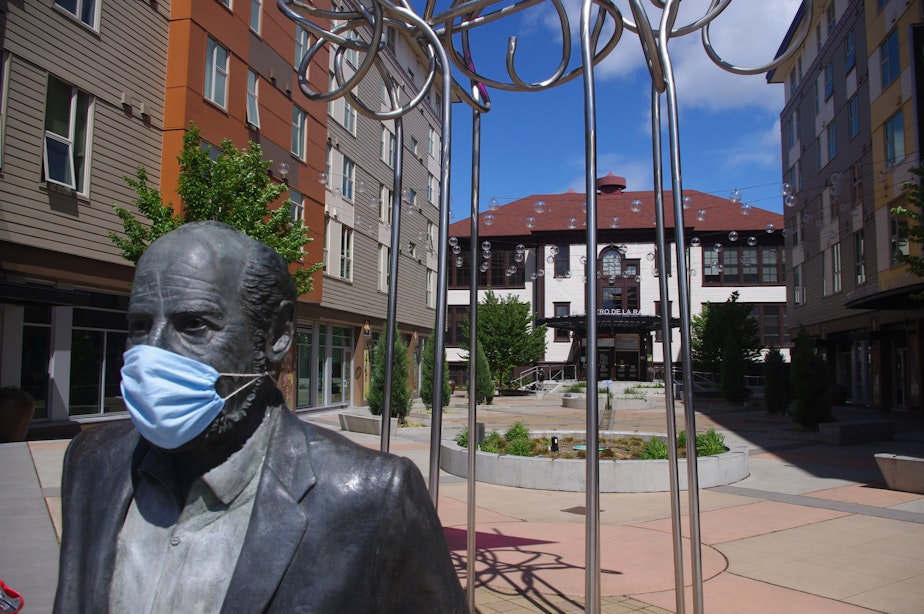In Seattle, working around the clock to secure paycheck protection loans

Small businesses are in a mad dash to apply for a second round of funding under the Paycheck Protection Program.
Some bankers say larger banks and businesses dominated the first round of funding, snapping up the money for these low-interest forgivable loans ahead of the small businesses the program was intended to help.
This time, they say, small lenders and their clients are having more success.
Officials with the Small Business Administration say they made changes to address barriers to small lenders and businesses.
Estela Ortega is the executive director of El Centro de la Raza, a community support organization in Seattle’s Beacon Hill neighborhood. She described her PPP loan application process as “incredibly time-consuming and frustrating.”
Ortega sought a loan during the first round of funding. The loans are forgivable if borrowers use them primarily to meet payroll during the business closures required to stop the spread of the coronavirus.
Sponsored
Ortega wanted to help offset the center’s losses in childcare tuition and event rentals. She first tried to apply through her national bank when they advised her that the portal was open.
“My poor controller was checking every hour starting at midnight,” she said.
It didn’t work. That bank advised Ortega to go through other lenders. Those lenders advised her to go to multiple institutions at once.
Ultimately she contacted a local lender, Heritage Bank. Finally luck was on her side.
“The next morning at 8 o’clock I received an email from the bank letting me know that the application had gone in and had been approved, and I was stunned” at the quick turnaround, she said.
Sponsored
But then there was more information to submit – third parties had to vouch for El Centro’s expenses like pensions and insurance.
Ortega said she prides herself on having good systems in place, and even for them it was a scramble to obtain the loan.
“I worry about the small mom-and-pop entities who may not have everything so readily available to them; that it’s going to prevent those people from getting access to these funds," she said.
The loan recipients aren’t public so far, except for those companies that have filed notice with the SEC. But the Center for Responsible Lending and the Brookings Institution have raised alarms that up to 90% of minority and women-owned businesses may have been excluded from the first round of $349 billion. Many banks chose to work only with existing clients, and those small businesses may not have had a lender to help them apply.
Now the Small Business Administration is accepting applications for a second round with another $310 billion available.
Sponsored
Jeremy Field runs the Small Business Administration’s Pacific Northwest office. He said $90 billion in loans from that new round have been approved so far. This time, he said the average loan is smaller, and more small lenders are obtaining the funds.
“A substantial 82% of approved Paycheck Protection loans have been made by small and medium lenders in the second round of PPP funding as of April 29,” he said.
Last Wednesday, the agency held a special filing time just for small banks.
With a third of this funding spoken for, some banks say they don’t have capacity for any more applicants right now. But Brad Goode with Seattle-based Washington Federal Bank said they’re still taking clients.
“It’s been a challenge as you’ve heard. I’m not going to argue that,” he said. “We’ve had a team here at Washington Federal Bank of about 200 community bankers, commercial bankers, executives, department heads basically working around the clock.”
He said his bank has 7,000 loans funded or in the pipeline, mostly in the Northwest. And the bank has worked with anyone who wants to apply.
Sponsored
“A lot of banks when they opened this up just said they were going to open this up to existing clients,” Goode said. “And we took the approach that said we should be there as a bank in a community to help any business whether they’re a client or not.”
Goode says about half of their loan applications have come from new clients. And he thinks those loans are fulfilling the goals of the program.
“Our average loan size is roughly $150,000," he said. "That means we’re helping a lot of those small businesses, which is where the money was intended to go, and we feel really good about that.”
In the last few weeks, the Washington State Employees Credit Union, has jumped in to help clients apply for the PPP loans.
“Upon seeing the impact the pandemic could have on our few thousand business accounts, we applied to become an authorized lender,” CEO Gary Swindler said.
While they missed the first round, Swindler said the second round has come with important changes that are more favorable to their borrowers.
Sponsored
“The SBA also earmarked a portion of the funding for smaller banks and credit unions after seeing some larger banks and businesses dominate the first round of funding,” he said.
So far Swindler said, they’ve had 85 applications approved, with an average loan size of $37,000, to clients including landscapers, lawyers, craft shops, engineers and dance studios.
But the loans only go so far. At El Centro de la Raza, Estela Ortega noted that the loan covered salaries for two and a half months. That time is already running out.
“Two-and-a-half months is March, April, part of May,” she said.
Meanwhile Ortega said many employees are working remotely, and getting an increasing number of calls from people seeking rental assistance and other types of help.




